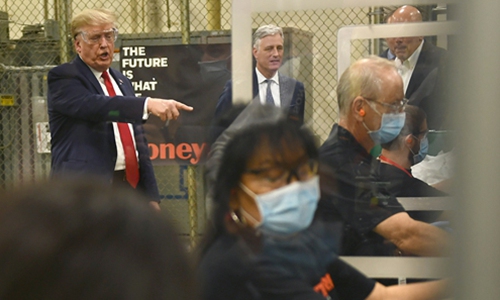Frightening US conspiracy theorists attack masks
By Rong Xiaoqing Source:Global Times Published: 2020/5/14 12:59:11

US President Donald Trump (left) participates in a tour of a Honeywell International plant that manufactures personal protective equipment in Phoenix, Arizona on May 5, 2020. Photo: AFP
When I wrote an article in this column in mid-March that discussed the befuddling discouragement of US authorities against ordinary people wearing masks, I never thought I would see the same horror story develop into a second episode, only to be scarier.
Not long after that article, governments - both local and federal - changed their guidelines by 180 degrees. They recommended everyone wear masks in public, citing newly released research about asymptomatic novel coronavirus carriers who pose major risks.
Some nuanced face-saving tactics were adopted to rescue government officials from the embarrassment of directly countering their own previous directives. For example, when New York City Mayor Bill de Blasio first called for wearing masks at a press briefing on April 2, he called it "face covering."
"I want to actually not use the word masks because when you think of masks, you're talking about what our healthcare workers and our first responders need," said the mayor. "I'm talking about face coverings to distinguish things you can create yourself - like I said, scarfs, bandanas," he added.
Ok, whatever you would like to call it, as long as the leaders have realized the importance of wearing masks, things would only get better, I thought.
It turned out I was wrong. The free will of the free-willed people in the US is so strong that it easily overwhelmed government directives. Sometimes this was done in brutally stupid ways.
On May 1, an argument broke out at a grocery shop in Manhattan's Chinatown between the Chinese owner and two customers. Police were called, and all parties were arrested. In the end, the heated quarrel almost escalated into a racial discrimination lawsuit. This was because the owner of the store asked the customers to wear masks in line with the city's recommendation. The stubborn customers declined.
On the same day, in this case at a Family Dollar store in Flint, Michigan, a security guard named Calvin Munerlyn spotted a girl who didn't wear a mask coming in with her mom. When Munerlyn tried to persuade the girl to follow the store's policy for customers to wear masks, he got into an argument with her mom, Sharmel Teague.
About 20 minutes after the pair left, Sharmel's husband Larry Teague and her adult son Ramonyea Bishop arrived at the store. Bishop allegedly shot the security guard in the head, killing him.
This may be an extreme case, but it is reflective of a wider picture emerging in the US.
At one shop in Illinois state, a customer who didn't want to wear a mask threatened to shoot a staff member who requested him to abide by their safety policy and put one on. At another shop, another angry unmasked customer wielded a hunting knife. And at various protests around the country, those opposed to the lockdowns have carried rifles and handguns, but didn't don masks. In Oklahoma city, a requirement for wearing masks in public survived only for a few hours before the mandatory measure was changed into a recommendation amid surging public resistance.
And for the Costco market chain, which started requiring customers (who pay a membership fee to get its discounted deals) to wear masks on May 4, another crisis erupted. Its healthcare measures led to a nationwide boycott from belligerent customers. "You are an American corporation with an obligation to support our American values, dictating face mask for your workers is one thing but forcing this on your loyal members who paid for a membership is a complete abuse of power," said one customer on Twitter.
This bizarre anti-mask movement is being encouraged from the top. A non-mask wearing President Donald Trump and a non-mask wearing Vice President Mike Pence have stood side by side with cabinet officials and many others in meetings and at daily briefings throughout the crisis. Trump visited a mask manufacturing factory recently, and Pence a hospital - neither wearing a mask in a place where they should have donned one.
Inside the White House itself, there was no formal policy requiring staff members to wear masks until Monday. This was implemented only after a valet of the president and a spokesperson for the vice president tested positive for the novel coronavirus. This was more than a month after the US Centers for Disease Control and Prevention issued guidelines calling for wearing masks in public.
Some Trump supporters have interpreted this as a signal that no one should be forced to wear a mask, neither by a local government, nor by a store, nor by anyone else. They feel these mandates infringe on their civil liberties. This extends to matters beyond masks. Many Americans worry people will also boycott vaccines too. There are currently tons of conspiracy theorists on social media claiming that the whole pandemic is a diabolical plot to turn humanity into robots - using vaccines of course.
Altogether, this is a frightening mess.
The author is a New York-based journalist and Alicia Patterson fellow. rong_xiaoqing@hotmail.com
Posted in: VIEWPOINT